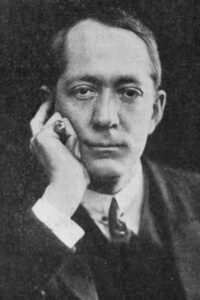
The Blue Lights, A detective story
He paid no attention to the attempts of two clumsy collie puppies to attract his favourable notice. Still, he contented himself with quickly surveying the broad, comfortable veranda, with its big, roomy chairs, the wicker table bearing a great jar of red peonies, and the smooth green lawns swept by the late afternoon sun.
“Fine old place,” he muttered to himself. “Wonder if I can persuade him to go?”
As the car which had brought Mr Hodgman on his hasty trip from Washington dashed up to the front of the house, Grace Duvall was approaching it from the rear, looking very charming in a blue linen dress.
She held a pair of shears, and her apron overflowed with hundred-leaf roses. “Dick—oh, Dick!” she called as she came down the long avenue of syringas and lilacs which led to the house. “The sweet peas are nearly ready to bloom.”
Richard Duvall, looking as simply pastoral as though he had never tracked an international crook to cover, raised his head from the flower bed, in which he had been carefully setting out circle after circle of geranium plants.
“Are they?” he laughed. “That’s good. Now, all we need is a few good hot days.” He gathered up his trowel and rake and started toward the barn.
Grace put her arm through her husband’s, and together, they strolled across the springy green turf, their faces smiling and happy. The honeymoon showed no signs of waning.
This lovely old country place in southern Maryland had been Richard Duvall’s dream for many years, and after his marriage to Grace Ellicott in Paris, it had become hers, as well. It was only a short time after their return to America that they decided to make it a reality.
Grace had encouraged her husband to give up, for a time at least, his warfare against crime and his pursuit of criminals of the higher and more dangerous type. She had also persuaded him to buy the farm that had once belonged to his mother’s people and settle down to the life of a country gentleman.
Read or download Book
Frederic Arnold Kummer
Frederic Arnold Kummer Sr. (August 5, 1873 – November 22, 1943) was an American author, playwright and screenwriter. He also used the pseudonym Arnold Fredericks. Several of his works were made into movies. A caricature of him is on the wall of Sardi’s restaurant.
Early life
Frederic Arnold Kummer was born in Catonsville, Maryland, to Arnold Kummer. His father was a banker and his mother was of a Quaker family. He was educated in public schools and Rensselaer Polytechnic Institute.
Career
Kummer became a life member of the American Society of Civil Engineers and assistant editor of the Railroad Gazette. He also became the president of a wood block paving company, but the company failed during the Panic of 1907. Kummer then became an author. Kummer wrote stories and plays. He wrote the play The Painted Woman which premiered at the Auditorium Theatre in 1917. It came to Baltimore in 1938 as the opera Captive, with music by Gustav Strube. In testimony to the House of Representatives Special Committee on Un-American Activities, he was noted as a member of the executive committee of the XV International Brigade, a volunteer military unit that fought for the pro-socialist Republic of Spain during the Spanish Civil War.
Personal life
Kummer built a house in Guilford, Maryland. He later relocated to West Lafayette and later Park Avenue in Baltimore. Kummer married twice. He first married playwright Clare Kummer (born Clare Rodman Beecher) in 1895. They had two daughters, Marjorie (who married English actor Roland Young) and Frederica. They divorced in 1903 (she was remarried to Arthur Henry in 1910). Kummer also had three more children. His son Frederic Arnold Kummer Jr. was also an author. In 1927, Kummer was hospitalized at Union Memorial Hospital and newspapers falsely reported his death. He died on November 22, 1943, at his home at 1501 Park Avenue in Baltimore. He was buried at Loudon Park Cemetery.






